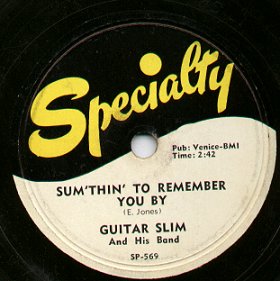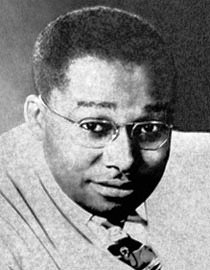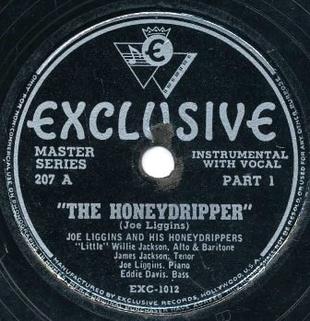Related Research Articles
Rhythm and blues, frequently abbreviated as R&B or R'n'B, is a genre of popular music that originated in African-American communities in the 1940s. The term was originally used by record companies to describe recordings marketed predominantly to urban African Americans, at a time when "urbane, rocking, jazz based music ... [with a] heavy, insistent beat" was becoming more popular. In the commercial rhythm and blues music typical of the 1950s through the 1970s, the bands usually consisted of a piano, one or two guitars, bass, drums, one or more saxophones, and sometimes background vocalists. R&B lyrical themes often encapsulate the African-American experience of pain and the quest for freedom and joy, as well as triumphs and failures in terms of relationships, economics, and aspirations.

"Rocket 88" is a song that was first recorded in Memphis, Tennessee, in March 1951. The recording was credited to "Jackie Brenston and his Delta Cats", who were actually Ike Turner and his Kings of Rhythm. The single reached number one on the Billboard R&B chart.

Joseph Vernon "Big Joe" Turner Jr. was an American singer from Kansas City, Missouri. According to songwriter Doc Pomus, "Rock and roll would have never happened without him." Turner's greatest fame was due to his rock-and-roll recordings in the 1950s, particularly "Shake, Rattle and Roll", but his career as a performer endured from the 1920s into the 1980s.

Ruth Alston Brown was an American singer-songwriter and actress, sometimes referred to as the "Queen of R&B". She was noted for bringing a pop music style to R&B music in a series of hit songs for Atlantic Records in the 1950s, such as "So Long", "Teardrops from My Eyes" and "(Mama) He Treats Your Daughter Mean". For these contributions, Atlantic became known as "the house that Ruth built". Brown was a 1993 inductee into the Rock and Roll Hall of Fame.

Myron Carlton "Tiny" Bradshaw was an American jazz and rhythm and blues bandleader, singer, composer, pianist, and drummer. His biggest hit was "Well Oh Well" in 1950, and the following year he recorded "The Train Kept A-Rollin'", important to the development of rock and roll; he co-wrote and sang on both records.

James Witherspoon was an American jump blues singer.

Specialty Records was an American record label founded in Los Angeles in 1945 by Art Rupe. It was known for rhythm and blues, gospel, and early rock and roll, and recorded artists such as Little Richard, Guitar Slim, Percy Mayfield, and Lloyd Price. Rupe established the company under the name Juke Box Records but changed it to Specialty in 1946 when he parted company with a couple of his original partners. Rupe's daughter, Beverly, restarted the label in the 1980s.
The origins of rock and roll are complex. Rock and roll emerged as a defined musical style in the United States in the early to mid-1950s. It derived most directly from the rhythm and blues music of the 1940s, which itself developed from earlier blues, the beat-heavy jump blues, boogie woogie, up-tempo jazz, and swing music. It was also influenced by gospel, country and western, and traditional folk music. Rock and roll in turn provided the main basis for the music that, since the mid-1960s, has been generally known simply as rock music.

John Marshall Alexander Jr., known by the stage name Johnny Ace, was an American rhythm-and-blues singer. He had a string of hit singles in the mid-1950s. Alexander died of an accidental self-inflicted gunshot wound at the age of 25.
"Goodnite, Sweetheart, Goodnite" is a popular song that was a hit during the mid-1950s. It was written by Calvin Carter and James "Pookie" Hudson in 1951, and was first recorded by The Spaniels in 1953. It has also been released by some artists as "Goodnight, Well It's Time to Go".

Roy James Brown was an American blues singer who had a significant influence on the early development of rock and roll and the direction of R&B. His original song and hit recording "Good Rockin' Tonight" has been covered by many artists including Wynonie Harris, Elvis Presley, Bruce Springsteen, Paul McCartney, Joe Ely, Ricky Nelson, Jerry Lee Lewis, Pat Boone, James Brown, the Doors, and the rock group Montrose. Brown was one of the first popular R&B singers to perform songs with a gospel-steeped delivery, which was then considered taboo by many churches. In addition, his melismatic, pleading vocal style influenced notable artists such as B.B. King, Bobby Bland, Elvis Presley, Jackie Wilson, James Brown and Little Richard.

Joseph Christopher Liggins, Jr. was an American R&B, jazz and blues pianist and vocalist who led Joe Liggins and his Honeydrippers in the 1940s and 1950s. His band appeared often on the Billboard magazine charts. The band's biggest hit was "The Honeydripper", released in 1945. Joe Liggins was the older brother of R&B performer Jimmy Liggins.
Jesse Albert Stone was an American rhythm and blues musician and songwriter whose influence spanned a wide range of genres. He also used the pseudonyms Charles Calhoun and Chuck Calhoun. His best-known composition as Calhoun was "Shake, Rattle and Roll".

Jimmy Liggins was an American R&B guitarist and bandleader. His brother was the more commercially successful R&B/blues pianist, Joe Liggins.
"What a Diff'rence a Day Made", also recorded as "What a Difference a Day Makes", is a popular song originally written in Spanish by María Grever, a Mexican songwriter, in 1934 with the title "Cuando vuelva a tu lado" and first recorded by Orquesta Pedro Vía that same year. A popular version in Spanish was later recorded by trio Los Panchos with Eydie Gormé in 1964.

"The Honeydripper " is an R&B song by Joe Liggins and his Honeydrippers which topped the US Billboard R&B chart for 18 weeks, from September 1945 to January 1946.
"Eddie My Love" is a 1956 doo wop song. According to BMI and ASCAP, the song was written by Maxwell Davis (BMI), Aaron Collins, Jr. (ASCAP), and Sam Ling (BMI). Maxwell Davis played sax on the Teen Queens record. Aaron Collins was the brother of the Teen Queens. Sam Ling was an alias of Saul Bihari, co-founder of Modern, RPM, and other labels.
"Reconsider Me" is a country/soul ballad written by Margaret Lewis and Mira Smith.

The Four Fellows were an American doo-wop group formed in Brooklyn, New York, in 1953. The combo possessed a more polished and professional style than much of their regional contemporaries, reflecting upon influences from gospel and barbershop music. In the Four Fellows' recording career, they underwent multiple line-up changes with lead singer Jimmy McGowan remaining the sole consistent member of the group until it disbanded in 1956. The group released several singles, but their one and only national hit came in 1955, with the distribution of "Soldier Boy", a Top 10 song on the Billboard R&B charts.
References
- ↑ "ASCAP Repertory entry for this song". ASCAP. Retrieved May 16, 2021.
- ↑ Gérard Herzhaft, Paul Harris, Jerry Haussler Encyclopedia of the Blues 1997 p. 30 "His brother JIMMY LIGGINS (1924-1984), a guitar and sometimes harmonica player, was also successful with "Drunk" and "Saturday Night Boogie-Woogie Man," which made his reputation on the West Coast."
- ↑ Brian Ward Just My Soul Responding: Rhythm And Blues 0203214455 2003 p.77 ""Came home one night with a spinning in my head/reached for the pillow, missed the whole darned bed", moaned Jimmy Liggins on "Drunk"."
- ↑ "Top Rhythm & Blues Records". Billboard. November 14, 1953. p. 49.
- ↑ "Top R & B Records". Billboard. January 2, 1954. p. 30.